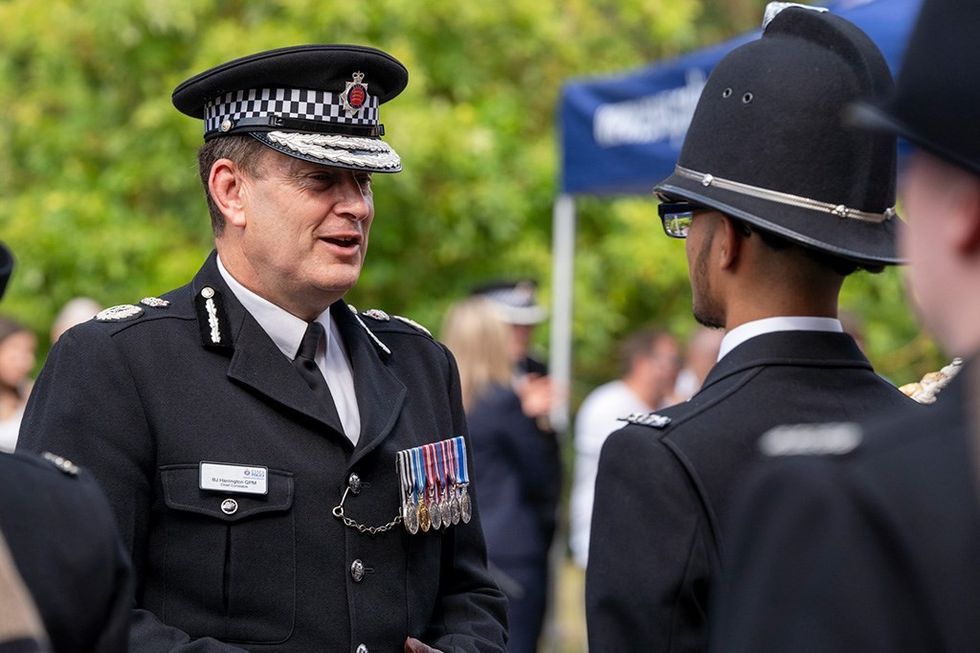James Saunders
Guest Reporter
Essex Police has now set up a "gold group", usually reserved for major crimes, to handle its controversial investigation into journalist Allison Pearson's so-called "non-crime hate incident".
Pearson has found herself at the centre of an "Orwellian" "thought police" row over the probe after she allegedly incited racial hatred last year.
She faced a visit from police on Remembrance Sunday this year over her 2023 social media use - but officers refused to tell her either who made the complaint against her or which post was being investigated.
Pearson says officers told her they were investigating a "non-crime hate incident" - but the force claims this was "wholly inaccurate" and said that it has body-cam footage of the visit "as the public would expect" which "entirely supports" its position.

On Friday, it emerged that Essex Police had set up a gold group - usually reserved for major incidents like terror attacks - to handle the investigation.
The purpose of gold groups is to ensure the "effectiveness of ongoing police response", and they are usually led by assistant chief constables or higher.
His Majesty's Inspectorate of Constabulary and Fire & Rescue Services say a gold group is set up to "improve the police response to an incident, crime or other matter".
Its guidance states: "This involves bringing together appropriately skilled and qualified interested parties who can advise, guide or otherwise support the management of an effective response to the identified incident, crime or other matter."
FREE SPEECH IN PERIL - READ MORE ON ALLISON PEARSON:

The Telegraph reported that her social media post in question was first reported to the Metropolitan Police as a potential breach of the Malicious Communications Act last November.
The case was then passed to Sussex Police, which labelled it a possible non-crime hate incident, as well as a potential malicious communication.
Sussex Police eventually opted to pass the case on to Essex Police, which covers the area where Pearson lives.
Essex Police assessed the complaint twice before opening an investigation under Section 17 of the Public Order Act 1986 over material allegedly "likely or intended to cause racial hatred", and visiting her house.
Councillor Neil Gregory, a substitute member of the Essex Police, Fire and Crime Panel, accused Essex Police of "institutional incompetence and dysfunction on an epic scale".
He told The Telegraph: "It is certainly the impression I get that they are prioritising diversity over real crime.
"Sadly the appalling treatment of Allison is merely the tip of the iceberg of an obsession with diversity, neglect of crime and institutional incompetence and dysfunction on an epic scale."
Alongside his scathing remarks, Essex Police has come under significant scrutiny from leading politicians.
Boris Johnson, Liz Truss, Robert Jenrick, Nigel Farage, Suella Braverman, Richard Tice and Chris Philp have been among those who have spoken out in defence of the Telegraph writer.
X owner Elon Musk also used Pearson's case to level criticism at the state of policing in the UK - following his continued attacks on Labour's response to the summer riots earlier this year.

An Essex Police spokesman said: "Officers went to a residential address to arrange a time to do an interview with a woman about a complaint made by a member of the public.
"That's why, under the Police and Criminal Evidence Act 1984, no further information was provided - this call was made by officers, who were in the area at the time, to simply set up a time to speak in the coming days.
"At no stage during the short interaction between the woman and our officers was she informed that the report being investigated was being treated as a non-crime hate incident. To suggest otherwise is wholly inaccurate and misleading.
"As the public would expect, we have body-worn video of this interaction which entirely supports our position in this respect."
Police have also lodged a complaint with press regulator Ipso over "large amounts of false reporting" over the probe.
Find Out More...
Pearson has found herself at the centre of an "Orwellian" "thought police" row over the probe after she allegedly incited racial hatred last year.
She faced a visit from police on Remembrance Sunday this year over her 2023 social media use - but officers refused to tell her either who made the complaint against her or which post was being investigated.
Pearson says officers told her they were investigating a "non-crime hate incident" - but the force claims this was "wholly inaccurate" and said that it has body-cam footage of the visit "as the public would expect" which "entirely supports" its position.

On Friday, it emerged that Essex Police had set up a gold group - usually reserved for major incidents like terror attacks - to handle the investigation.
The purpose of gold groups is to ensure the "effectiveness of ongoing police response", and they are usually led by assistant chief constables or higher.
His Majesty's Inspectorate of Constabulary and Fire & Rescue Services say a gold group is set up to "improve the police response to an incident, crime or other matter".
Its guidance states: "This involves bringing together appropriately skilled and qualified interested parties who can advise, guide or otherwise support the management of an effective response to the identified incident, crime or other matter."
FREE SPEECH IN PERIL - READ MORE ON ALLISON PEARSON:
- 'Jackboot of tyranny!' Allison Pearson warns how 'shocking' police probe shows 'thought control' is 'shaping morality'
- ‘It’s utter tosh!’ Barrister says ‘get rid’ of non-crime hate incidents as backlash grows over Allison Pearson investigation
- THREE police forces involved in Pearson probe over 'non-crime hate incident'

The Telegraph reported that her social media post in question was first reported to the Metropolitan Police as a potential breach of the Malicious Communications Act last November.
The case was then passed to Sussex Police, which labelled it a possible non-crime hate incident, as well as a potential malicious communication.
Sussex Police eventually opted to pass the case on to Essex Police, which covers the area where Pearson lives.
Essex Police assessed the complaint twice before opening an investigation under Section 17 of the Public Order Act 1986 over material allegedly "likely or intended to cause racial hatred", and visiting her house.
Councillor Neil Gregory, a substitute member of the Essex Police, Fire and Crime Panel, accused Essex Police of "institutional incompetence and dysfunction on an epic scale".
He told The Telegraph: "It is certainly the impression I get that they are prioritising diversity over real crime.
"Sadly the appalling treatment of Allison is merely the tip of the iceberg of an obsession with diversity, neglect of crime and institutional incompetence and dysfunction on an epic scale."
Alongside his scathing remarks, Essex Police has come under significant scrutiny from leading politicians.
Boris Johnson, Liz Truss, Robert Jenrick, Nigel Farage, Suella Braverman, Richard Tice and Chris Philp have been among those who have spoken out in defence of the Telegraph writer.
X owner Elon Musk also used Pearson's case to level criticism at the state of policing in the UK - following his continued attacks on Labour's response to the summer riots earlier this year.

An Essex Police spokesman said: "Officers went to a residential address to arrange a time to do an interview with a woman about a complaint made by a member of the public.
"That's why, under the Police and Criminal Evidence Act 1984, no further information was provided - this call was made by officers, who were in the area at the time, to simply set up a time to speak in the coming days.
"At no stage during the short interaction between the woman and our officers was she informed that the report being investigated was being treated as a non-crime hate incident. To suggest otherwise is wholly inaccurate and misleading.
"As the public would expect, we have body-worn video of this interaction which entirely supports our position in this respect."
Police have also lodged a complaint with press regulator Ipso over "large amounts of false reporting" over the probe.
Find Out More...
